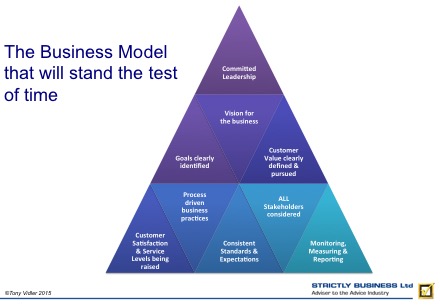Anybody who has had the privilege of seeing the Great Pyramids up close will recall how perfectly symmetrical and “in balance” they are from a distance as you approach them. When you are right there at the base and looking upwards one of the overwhelming impressions is just how big each of those individual blocks are that created this graceful building.
So it is with building a superb business, and that is especially so when the business is a purely professional service enterprise. There are no products to sell really, no tangible factors of consequence to deliver, and no thrilling memories or experiences that will be shared via photo’s and video’s on social media by customers with all of their friends and family.
Building a superb business that will withstand the tests of time, technology and innovation requires the same approach as building the Great Pyramids. It is one massive block carved from nature which is then painstakingly put into place with significant labour that begins the pyramid. Then another is added….and another….

There is always debate about whether a great business starts with great leadership, or whether great leadership simply must be present for the business to become great…and it is a moot point here. If one is ton build a great professional services business there are essentially 9 big components.
1. Consistent standards and expectations.
The standards of advice, competency, service standards must be consistent and continuous. So too must the values and expectations of those involved. This area is the foundation stone of the pyramid.
2. A clear focus on having satisfied customers with consistent service experiences.
However, it is not enough to simply create great standards, there must be an expectation that they will continue to evolve further. Consumer expectations are not static.
3. An early commitment to being business like.
Monitor, measure, report….information and data and measuring the things that matter are the keys to analysing performance and highlighting opportunities. They are the cornerstone of efficiency and good decision making.
4. Understanding that the business is bigger than its owner, or even its shareholders.
Knowing who the stakeholders are and continually being mindful of all parties interests and concerns. One of the deadliest things to any business is the runaway ego owner who thinks their agenda is primary. It isn’t. Enough said.
5. Creating processes wherever possible within the practice.
Processes reduce inefficiency, reduce errors, and produce consistent client experiences. They remove risk from the business, and maximise returns to owners. Processes are gold.
6. Customer Value is clear.
It may seem strange having this placed where it is, however most professional services firms begin by being many things to many people and then obtain clarity about their customer value. When a practice is in tune with its customers and obtaining excellent feedback and understanding expectations it is then better placed to focus on pursuing what customers really value, instead of what we thought they valued.
7. Goals clearly defined.
The goals for the business must be clear…not just the business owner’s goals. Those goals must be successfully shared with, and be relevant to, the key people inside the business. This is where teams gel…
8. Vision.
This is often underestimated in terms of its importance. No race is fun though if there is no finish line. What is the end game? The fuel that will keep the practice moving forward is an understanding of what is trying to be built and why.
9. Committed Leadership.
A champion for their people…a visionary…a leader demonstrating and instilling the values…someone who can maintain the focus on what matters, and make the decisions that matter. Without this there may still be a business, but not one which fulfil its potential.
Without any of these elements you can still have a business which makes some money of course. It just won’t be one which is valuable enough to be attractive to customers and competitors alike because it will withstand the winds of change, and impose itself on its surroundings.


